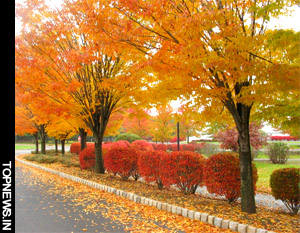Light helps beat the winter blues
 Berlin/Leipzig - Autumn is a time when nature prepares to rest, and a lot of people begin to withdraw into themselves too. They have no desire to meet with friends after work, preferring to sit lethargically in front of the television before going to bed early. And the next morning they find it hard to get up.
Berlin/Leipzig - Autumn is a time when nature prepares to rest, and a lot of people begin to withdraw into themselves too. They have no desire to meet with friends after work, preferring to sit lethargically in front of the television before going to bed early. And the next morning they find it hard to get up.
For most people, this period of languor passes without any major effects. But a small minority suffer from out-and-out winter depression. Apart from lethargy and fatigue, the latter group often has symptoms uncharacteristic of depressive disorder.
"They have an increased need for sleep, and also for carbohydrates like chocolate," noted Dieter Kunz, a chronobiologist and head physician in the sleep-medicine department at St. Hedwig Hospital in Berlin. Normally, depression is accompanied by insomnia and loss of appetite.
In Kunz's estimation, 3 to 5 per cent of Germany's population suffer from winter depression. And another 25 per cent are conscious of mood changes.
"These are the same mechanisms that take effect in animals before hibernation," Kunz said. The mechanisms are no longer functional in humans, however, because humans are supplied with food all year round.
True winter depression exists when the symptoms occur with a certain regularity in autumn and winter. "Moreover, the disorder has to last at least two weeks," explained Professor Ulrich Hegerl, a member of the Leipzig-based German Research Network on Depression and Suicidality.
Light deprivation during the cold months is the cause of people's depressed mood. "Scientists believe that light controls the melatonin system and influences the serotonin system," remarked Professor Ulrich Voderholzer, chairman of the Berlin-based German Society of Psychiatry, Psychotherapy and Neurology (DGPPN).
The neurotransmitter melatonin regulates the sleep-wake cycle and the need for sleep. Serotonin, on the other hand, has a direct stimulative effect and brightens people's mood.
Symptoms of winter depression typically begin in October, November or December, and abate in January.
"The symptoms decrease when the days grow longer again," Voderholzer said. Since light blocks the secretion of melatonin, Hegerl said, sufferers should spend as much time outdoors as possible.
"Exercise is also a tested remedy for depression," Voderholzer said. A regular sleep-wake cycle can help too, and sufferers should stick to it even on weekends. By getting up early, they are exposed to more daylight regardless of the weather.
"Even a grey, overcast sky has about 10,000 lux," Kunz noted, using a standard unit of illumination. Special light-therapy lamps often have a lesser luminosity. On a bright, sunny day, natural luminosity can be as high as several hundreds of thousands of lux.
To receive the greatest benefit from sunlight, Kunz said, people should look into the sky -- though not directly at the sun. Every minute outdoors is important, he emphasized, pointing out that in the morning it helped simply to get out of the bus a stop earlier and walk the rest of the way to work.
Natural light is relatively weak indoors, even on sunny days. "Only a fraction of the light passes through the window," Hegerle said.
People lacking the spare time to go outside regularly can brighten their mood by using a light-therapy lamp at home. Tanning-bed sessions are not a suitable remedy, though. Light-therapy patients must keep their eyes open while sitting in front of the lamp. Its light, Voderholzer said, has no ultraviolet radiation. This is not the case with tanning beds, where eyes must be closed to prevent damage.
INFO BOX: A few minutes of light therapy can help
The more lux that a light-therapy lamp emits, the less time a patient has to sit in front of it. The recommended duration is about two hours for lamps with 2,500 lux, and between three-quarters of an hour and an hour with 10,000-lux lamps.
But briefer exposure to light can have a beneficial effect too. According to the Berlin-based chronobiologist Dieter Kunz, it even helps to place a lamp on the breakfast table and glance at it now and again.
"The light has an activating effect that you notice immediately," he said. The lamps cost between 150 and 300 euros (187 to 375 dollars), he noted.
Kunz advises people to consult a doctor, if they do not feel better after three or four days of therapy. Their problem, he said, was something other than winter depression. (dpa)